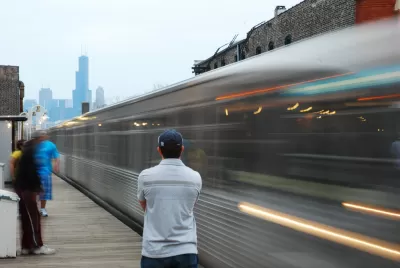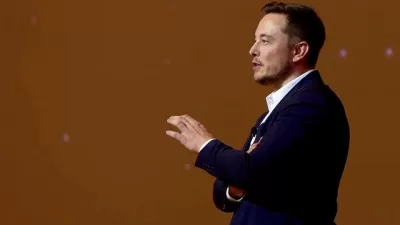Loop, as in a derivation of Hyperloop, conceived by Elon Musk and to be built by his newest venture, The Boring Company, is the technology of choice for high-speed transit to O'Hare Airport.

"Chicago Mayor Rahm Emanuel’s administration has selected Elon Musk’s company from four competing bids to provide high-speed transportation between downtown and the airport," report Bill Ruthhart and John Byrne for the Chicago Tribune on June 14.
The billionaire entrepreneur and the mayor appeared together in the superstation under the Block 37 retail development, report Ruthart, Byrne and Gregory Pratt after the actual ceremony. [See the video of segments of the two speeches in the cavernous station.] "Almost 10 years to the day after the Chicago Transit Authority (CTA) board suspended work on the station, Musk said his autonomous vehicles would eventually take off from there."
For those not familiar with Loop technology, it is "a high-speed underground public transportation system in which passengers are transported on autonomous electric skates traveling at 125-150 miles per hour," according to The Boring Company. "Electric skates will carry between 8 and 16 passengers (mass transit), or a single passenger vehicle."
Loop technology as applied for Los Angeles was panned by its critics here last month as "the latest manifestation of Elon Musk's transportation fantasies."
The Chicago Tribune has a video that offers a conceptual look at The Boring Company’s loop technology. Note the "LAX Terminal 2" destination on the skate.
To complicate the terminology, the Loop technology, which appears in a caption in the article as "Chicago Express Loop" rather than O'Hare Express, will transport passengers from the Chicago Loop, the city's central business district, which got its name in the late nineteenth century from cable car turnarounds and three elevated rail lines that encircled the area. The Loop refers to the 1.79-mile, elevated rail structure on which CTA trains operate.
Under the proposal, passengers would be able to travel from the Loop to O’Hare in just 12 minutes at an estimated cost of $20 to $25 per ride.
In choosing Boring, Emanuel and senior City Hall officials are counting on Musk’s highly touted but still unproven tunneling technology over the more traditional high-speed rail option that until recently had been envisioned..
============================================================================================================================
Past Planetizen posts on the O'Hare Express project
-
March 28, 2018The announcement of the finalists to build the O'Hare Express has critics even more concerned about the project's viability.Streetsblog Chicago
-
December 5, 2017Express rail between the Loop and O'Hare moves a step closer to realityProgressive Railroading
-
March 10, 2016This month, the city of Chicago will choose a team of engineers to brainstorm an express rail line to O'Hare Airport. The plan has come under criticism for diverting future resources away from transit in low-income areas.Chi.Streetsblog
-
July 13, 2015Plans to construct a prestigious express line to O'Hare airport may be overkill. The existing Blue Line, which could benefit from some investment, already connects downtown Chicago and the airport.Chi.Streetsblog
See The Boring Company tag for posts on the company's activity in Los Angeles.
FULL STORY: Chicago taps Elon Musk’s Boring Company to build high-speed transit tunnels that would tie Loop with O'Hare

Planetizen Federal Action Tracker
A weekly monitor of how Trump’s orders and actions are impacting planners and planning in America.

San Francisco's School District Spent $105M To Build Affordable Housing for Teachers — And That's Just the Beginning
SFUSD joins a growing list of school districts using their land holdings to address housing affordability challenges faced by their own employees.

The Tiny, Adorable $7,000 Car Turning Japan Onto EVs
The single seat Mibot charges from a regular plug as quickly as an iPad, and is about half the price of an average EV.

Seattle's Plan for Adopting Driverless Cars
Equity, safety, accessibility and affordability are front of mind as the city prepares for robotaxis and other autonomous vehicles.

As Trump Phases Out FEMA, Is It Time to Flee the Floodplains?
With less federal funding available for disaster relief efforts, the need to relocate at-risk communities is more urgent than ever.

With Protected Lanes, 460% More People Commute by Bike
For those needing more ammo, more data proving what we already knew is here.
Urban Design for Planners 1: Software Tools
This six-course series explores essential urban design concepts using open source software and equips planners with the tools they need to participate fully in the urban design process.
Planning for Universal Design
Learn the tools for implementing Universal Design in planning regulations.
Smith Gee Studio
City of Charlotte
City of Camden Redevelopment Agency
City of Astoria
Transportation Research & Education Center (TREC) at Portland State University
US High Speed Rail Association
City of Camden Redevelopment Agency
Municipality of Princeton (NJ)




























